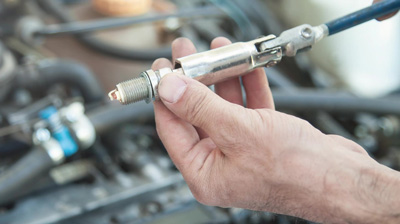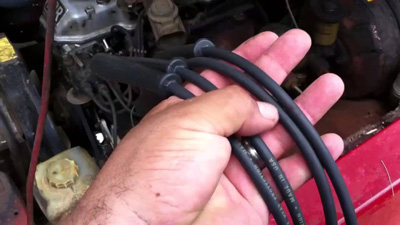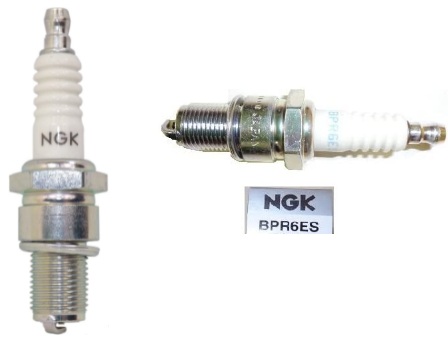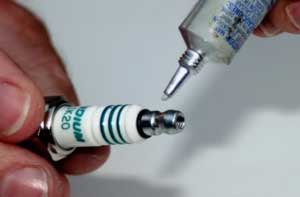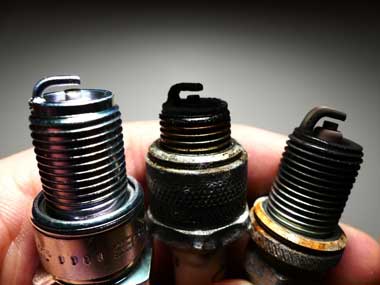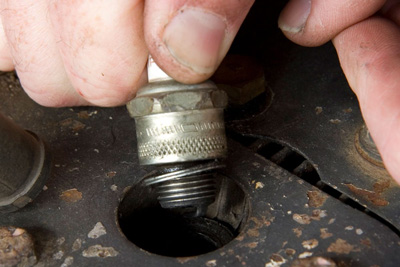Can Bad Spark Plugs Cause Knock Sensor Code? [Answered]
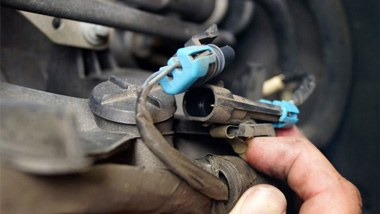

Why does my knock sensor keep going bad?
There are many reasons for which your knock sensor keeps going bad. The first reason would be the brightness of the check engine light. The second reason will be if you are dealing with your vehicle roughly. The third reason would be poor acceleration and miserable fuel economy.
Your knock sensor could also be gone bad for removing the knock sensor in the wrong way. If you shove the connectors in the wrong direction, it results in the sensor moving out of alignment and crack a fragile piece.
Another possible reason could be the consecutive vibration and squashing sounds coming out of the engine while driving at highway speed.
After replacing why knock sensor still getting code p0325
There can be two initial symptoms for having code p0325. The first symptom can be the radiance of the malfunctioning pointer lamp that exists on the dashboard. The second symptom can be the pinging sound coming from the engine. You can discover it at the time of acceleration.
After replacing why knock sensor light still on
The code points where you should be watching for a bad link, broken connection, ground difficulty etc. Guidebooksusually have instructions on general problems on what could trigger the light to come on constant or flashing, which means that the vehicle arrangement has a severe problem and should be pulled or checked soon enough.
Red light with oil load difficulty means you should quickly pull off the street examine the oil level. If you cannot notice the oil level on the dipstick, you should not start the vehicle as the oil pump might not hit up oil on sheer slopes or downhills.
Can a bad o2 sensor cause knock sensor code?
To discover engine knock due to an alarming 02 sensor, we must first decide if it is an automated or pre-ignition knock.
Pre-ignition knock is held in charge with knock sensors, not with 02 sensors. Pre-ignition knock can be affected by a high compression ratio or low octane rate of the fuel being utilized.
Ignition timing is monitored by the computer and will be retarded immediately if knock sensors pick up the knock. It usually occurs with engines with an excessive quantity of sparkling hot carbon residue in the blast chamber.
The power charge in the cylinder is burning too quickly in the stroke, which causes a knocking noise inside the engine space.
Can a bad battery cause a knock sensor code?
A sinking, fading car battery indicates low voltage. As a result, your vehicle computer, liable for notifying error codes and also getting low voltage. An error code will be created, triggering the check engine light or even the battery change warning light to reveal.
Does the knock sensor affect performance?
One of the horrible symptoms from a bad knock sensor will appear when the internal engine units will damage. If you let this situation escalate without restoring a faulty knock sensor, the engine will start to drag and shiver around.
A burning smell might come from the engine, which can reach the cabin of the vehicle. It is cheaper and easier to replace the knock sensor because it will take thousands of dollars to restore your entire engine.
What causes a knock sensor code?
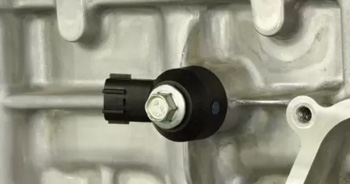
Engine knocks can be stimulated for many reasons, such as:
1. High Temperature
Your vehicle will be slower when it is hot outside because the heat creates the intake airless densely, enhancing the possibility of knock. The temperature of combustion gases will be elevated on hectic days. It will enable the risk of eruption before the cylinder is prepared to burn the mixture.
2. Low-quality fuel
Using the wrong fuel might cause an engine knock. If you drop an inadequate octane fuel in your power, it might cause an engine knock because an octane rating is fuels obstruction to an explosion via contraction. A higher octane rating will have a more significant obstacle to condensation ignition.
3. Buildup of Carbon
When a vehicle becomes, old carbon residues are found on valves, cylinder border and pistons. This carbon residue can develop hot areas that can provoke fuel unevenly.
4. Awful ECU calibration
An ECU is programmed to operate the engine to bend or in ignition timing. A bend air-fuel rate can maximize fuel thriftiness. Progressive timing burns the combination faster in the combustion cycle, and maximizes the power.
Both these circumstances can create engine knock carried to a severe level.
What activates a knock sensor?
If the combustion reaction is too erratic, or if it’s happening prematurely, this means something is off. This is generally referred to as engine knocking. The knock sensor activates when it detects irregular combustion timing to combat this. It then sends a signal to the engine’s computer, which uses the information to adjust and minimize the knocks.
How do I know if my spark plugs are going bad?
Here are a few of the main signs that you should look out for:
- Loss of Power: If you’ve noticed that your engine is struggling to achieve the same levels of power that it did before, it could be due to faulty spark plugs.
- Rough Idling: Another symptom of faulty spark plugs is a noticeable, rough idling. If the spark plugs are worn or damaged, the air/fuel mixture may need to be adequately ignited.
- Poor Fuel Economy: One of the most common signs of bad spark plugs is a sudden decrease in fuel economy.
What can set off a knock sensor code?
While many problems can cause a knock sensor code, here are the most common ones that set off a knock sensor code:
- Low octane fuel. A knock sensor is designed to detect the vibrations caused by a spark knock caused by low-octane fuel burning too fast. Thus, if you use fuel with a lower octane level than what is recommended, it can cause the knock sensor to set off an error code.
- Loose or worn spark plugs. Worn spark plugs can create too little to ignite the fuel, causing a spark to knock properly. Loose or worn spark plugs can also cause this problem.
- Oil contamination. Dirty oil or oil with a high level of contamination can cause the knock sensor to set off an error code.
- Weak or dead battery. A dead or weak battery can lead to problems with the engine’s electronics, and the knock sensor may also be affected in this case.
- Boosted pressure. Too much boost pressure in the intake can cause the engine to vibrate more than usual, setting off a knock sensor code.
- Heated air intake. When air is heated, it expands, causing more noise and vibration. This can also set off a knock sensor code.
- Cold weather. Cold weather can cause the engine to work overtime and set off a knock sensor code.
- Worn engine components. Worn-out components in the engine can cause excessive levels of vibration that can trigger the knock sensor code.
Is knock sensor code serious?
A knock sensor code can be a serious problem, so it should not be taken lightly. If you identify the code on your car, it’s important to prevent further damage immediately. You should get an expert opinion and have the issue attended to immediately.
Can a bad coil cause a knock sensor code
The answer is yes, a bad coil can cause a knock sensor code. It is important to pay attention to any warning signs of an issue and take the issue to your service center or mechanic. Replacing a faulty coil or any other necessary parts can protect your engine from further damage.
Knock sensor code went away
When the knock sensor code goes away, it can mean that the knock sensor can no longer detect knocks, and so it may not be able to identify any issues that could be causing engine problems. This can be a major concern as it can mean a problem with the engine that is not being diagnosed.
How to reset the knock sensor code
Fortunately, resetting your knock sensor code is an easy fix. Here’s how to do it:
- Locate your knock sensor. This can be found on the side of the engine block, near the firewall. It’s often circular and has a black plastic cover over the top.
- Unplug the wiring harness connected to the knock sensor. This harness should be two to three inches long and have two electrical connectors.
- Carefully remove the knock sensor from its mounting. This may require the use of a wrench or pliers.
- Once the knock sensor has been removed, use a wire brush to clean it and its wiring harness. Ensure all debris is removed from the sensor, as this can cause false readings and issues with the engine.
- Reinstall the knock sensor, making sure it’s securely mounted. The knock sensor must be properly seated and tight against the engine block.
- Plug the wiring harness back into the knock sensor and start your engine. The code should be reset, and your engine should now run smoothly.
Can a bad fuel injector cause a knock sensor?
Yes, a bad fuel injector can cause a knock sensor to fail. The fuel injector is responsible for delivering fuel to the engine, and a malfunctioning injector can decrease overall efficiency and performance.
Does knock sensor affect acceleration?
A faulty knock sensor can also lead to an excessive amount of fuel being injected into the engine, and this can cause the engine to become bogged down or stall. Excessive fuel injection can decrease acceleration if combined with a malfunctioning knock sensor.
How to fix bad spark plugs?
Fixing a bad spark plug is not a difficult task. Here’s a step-by-step guide on how to do it:
Step 1: Diagnose the Problem
Before fixing the spark plug, you need to diagnose the problem properly. Multiple tests can be done to determine the issue, such as a spark plug gap test or a combustion chamber test.
Step 2: Replace the Bad Plug
Once you’ve determined which spark plug is misfiring, it’s time to replace it. First, disengage the ignition system, unscrew the bad spark plug with a wrench or socket, and remove it from the cylinder head.
Step 3: Install the New Plug
Grab your new plug, ensure it’s the correct type, and dry it with a paper towel. Handle the spark plug with extra care and use the proper angle and torque when inserting it. Place it gently into the cylinder head and screw it in with a wrench or socket.
Step 4: Test the Spark Plug
Complete a final test to ensure the new spark plug is firing correctly and combustion occurs. Start the engine and listen for any strange noises coming from the area of the spark plug. This can help you determine if the plug is working properly or needs further adjustment.
What happens when a knock sensor goes bad
A bad knock sensor interrupts the engagement of the ignition timing by not detecting a knock in the engine. This can reduce the fuel economy and engine performance of the vehicle, as well as make it inefficient in acceleration and sluggish in response
Will a bad spark plug cause a knock?
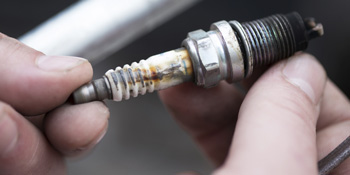
Yes, if your plugs remain tainted out, it can create a misfire which throws the timing away. If the timing is thrown out, then it throws knock code. If the knock code suspects vibration and suspects are misfiring, it retards the timing, which will cause a knock code.
What can cause knock sensor code?
- When the Engine runs in excessively lean condition
- Broken knock sensor cables
- Motor coolant mode fault
What codes can bad spark plugs cause?
A glowing inspection car light and a P0301 to P0312 diagnostic crisis code is a surefire reminder that one or more cylinders are misfiring. The havoc created by knock can happen suddenly and is unchangeable (without rebuild). A severe delay can create severe problems. Taking away the safeguard the computer has designed into it can only guide to more problems.
How To Diagnose And Repair Knock Sensor Problems (P0333)
FAQ
Can a misfire cause a knock sensor code?
Yes, a misfire can cause a knock sensor code. Abnormal oxidization of fuel and air can create the knock sensor to break down. Another symptom of a broken knock sensor is the engine’s misfiring or igniting, followed by new vibrations everywhere in the vehicle. Knock sensor failure is often supported by a vital drop in the fuel economy of the car.
Can you drive with a bad knock sensor?
The answer to this question is yes, but you should avoid driving with a bad sensor knock. When the procedure of the sensor is changed, there will be many shortcomings, such as deviation of the engine execution. The knock sensor is crucial for your car because it functions as the ear to your vehicle computer; it recognizes uncommon noises or vibration through engine combustion.
When the knock sensor is wrecked or broken, a dip will arise every time you try to launch your car. The inner side of the car engine will be hotter because of the malfunction in emission creation inside.
What happens if you disconnect the knock sensor?
You can check if your knock sensor is broken or damaged through ECU, so there is no need to disconnect it. If you divorce, it will not provide you with specific data. If there is a problem with the knock sensor itself, you will receive a trouble code of P0325 which is a circuit malfunction.

